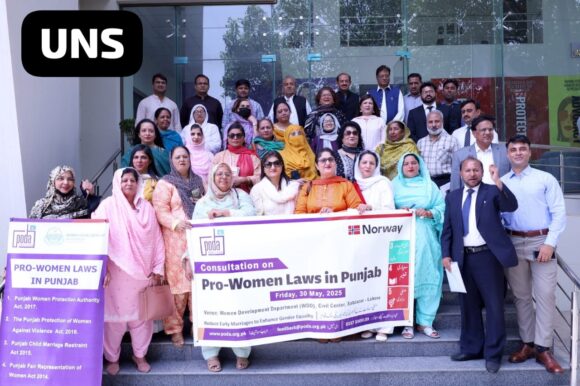LAHORE -UNS: Experts and stakeholders at a high-level consultation organized by the Potohar Organization for Development Advocacy (PODA), in collaboration with the Women Development Department (WDD) Punjab, identified key recommendations to bridge the gap between pro-women legislation and its implementation across the province.
The participants reinforced the recommendation to raise awareness at the grassroots level to ensure the effective implementation of existing laws for the collective benefit of society.
Key recommendations included the adoption of the Islamabad Capital Territory (ICT) Child Marriage Restraint Act 2025 by the Punjab Government, which sets 18 years as the minimum legal age of marriage for girls. Participants also urged that violations under the forthcoming Punjab Child Marriage Restraint Act be made cognizable, non-compoundable, and nonbailable to reduce underage marriages through stronger legal enforcement. It was recommended to empower Union Councils to take prompt action against violations involving child marriages at grassroots level.
The expert consultation was part of PODA’s project “Reduce Child Marriages to Enhance Gender Equality”, supported by the Norwegian Embassy, Islamabad. It brought together policymakers, civil society members, legal experts, and activists to review gaps between existing legislation and the on-ground realities in Punjab.
Parliamentary Secretary for the Women Development Department, Ms. Saadia Temur, chaired the session. She said women development department is dedicated to promoting gender equality and ensuring protection and empowerment of women through policy development, institutional support, and legislative reforms. She welcomed the efforts of the Punjab Government under the leadership of Chief Minister Ms. Maryam Nawaz for advancing women’s empowerment. Ms. Temur also announced that a women development center will be inaugurated by the end of June to support ongoing women-related programs.
Executive Director of PODA, Sameena Nazir, urged the government to constitutionally mandate matriculation—comprising 12 years of education—as the minimum educational requirement, emphasizing its importance for empowering girls and preventing early marriages.
Participants acknowledged the significant step taken through the passage of the ICT Child Marriage Restraint Act 2025 and urged Punjab to follow suit. They stressed that only through a combination of legal reform, administrative will, and grassroots mobilization can the province make real progress toward ending early and forced marriages and achieving gender equality.
Experts Call for adoption of legislation to end child marriages in Punjab
2




